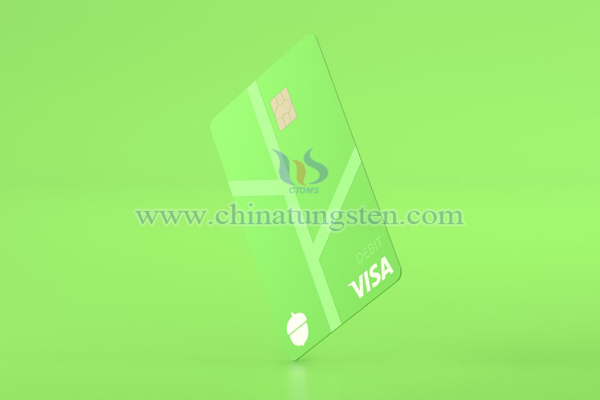This Debit Card Looks–And Acts–Like Nothing Else in Your Wallet
- Details
- Category: Tungsten's News
- Published on Thursday, 28 June 2018 11:08
The fintech company Acorns was founded in 2014 on a simple idea: For every purchase, why not round up and put those extra few cents in your savings account?
Four years and 3.5 million users later, Acorns is translating its philosophy of saving and investing your spare change into its first physical product: a debit card. Designed by the San Francisco-based firm Ammunition, Acorns’ debit card is the centerpiece of the company’s latest offering, a checking account that’s focused on helping you save money, not spend it. That means for everything you buy with your Acorns card, the service automatically rounds up and deposits the extra cents in your investment account–and you get to watch your savings grow without ever transferring money.

The challenge for the company was to design a physical product–one that could only be .7 of a millimeter thick–that could translate Acorns’ strong digital brand into three dimensions. Noah Kerner, Acorns’ CEO, wanted the card to make a statement about the person who uses it–that they’re investing, saving, and taking care of their finances. In other words, he wanted something that’s “not just a piece of plastic.”
Ammunition’s design tries to make this statement in part through materials: The card is made of the rare heavy metal tungsten alloy, with a painted matte finish. “We wanted it to feel really solid. It should feel like a piece of oak,” says Robert Brunner, founder and partner at Ammunition. “We didn’t want to go down the path of metal cards, of feeling too high-end–or even over-designed. Its density and weight almost feels magnetic. If you drop it on the table, it makes a thunk.”
That’s because tungsten is the heaviest non-radioactive element. It used to be present in the filament of incandescent light bulbs, though today you’re more likely to find it mixed with other metals to make industrial cutting and drilling tools (including dental drills). As of January 2018, the price for a kilogram of tungsten was $31.40–and while Kerner declined to say how much it costs Acorns to make a debit card out of the material, it’s certainly more than the plastic that most of us carry around in our wallets.
The same sense of solidity is echoed in the card’s visual design, which features a simplified tree branch emblem growing up the middle of the bright green card. The tree motif was inspired by the company’s driving motto, that “from acorns, mighty oaks do grow.” The design is oriented vertically, in part to mimic the upright nature of a tree, but also because we often orient our cards vertically now, with the increasing prevalence of chip readers. Plus, it’s a little visual reminder that Acorns is digital-first; it’s also reminiscent of how we hold our phones. It’s a design choice that other fintech companies, like Venmo, are already using to differentiate their credit and debit cards.
Ammunition also designed the card to stand out both in your wallet and when you pull it out. As creative director Jonas Lagerstedt points out, when you open your wallet, the vast majority of cards have a white edge. For Acorns, he decided that the bright green matting should wrap all the way around the card to help it stand out. Lagerstedt also hopes that the debit card’s design will spark conversations with the people who encounter it–a clever marketing tactic that will make its way into many users’ pockets.
The debit card and checking account costs an extra $1 per month if you already have an Acorn investment account and retirement account. As Kerner explains, many banks make money by charging unexpected or unpredictable fees–like overdraft fees, fees if you don’t hit a minimum balance, or transfer fees. Instead, Acorns has a single fee per month that ranges from $1 to $3, depending on which services you’re using, and doesn’t charge for anything else.
Since Acorns announced the new product this month, more than 150,000 people have preordered the card. The company will begin beta testing later this summer, and the card will officially launch this November.
- Tungsten Alloy Manufacturer & Supplier, Chinatungsten Online: www.tungsten-alloy.com
- Tungsten News & Prices of China Tungsten Industry Association: www.ctia.com.cn
- Molybdenum News & Price: news.molybdenum.com.cn
- Tel.: 86 592 5129696; Fax: 86 592 5129797; Email: sales@chinatungsten.com